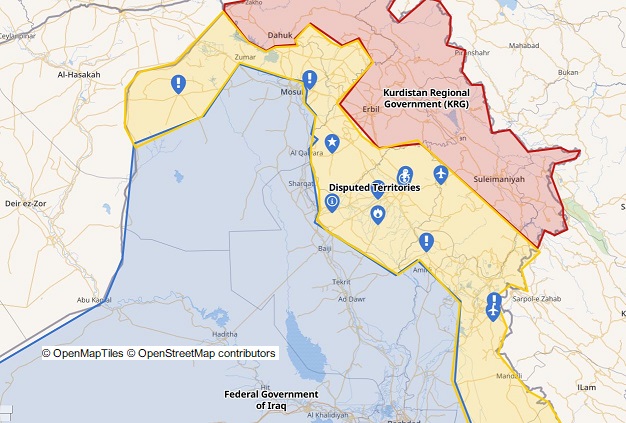Kirkuk
● The Independent High Electoral Commission (IHEC) announced that Kirkuk’s turnout in the parliamentary election was 44%. In the Kirkuk Governorate, Kurdish parties won six seats, Sunni Arabs won four, and one seat each was awarded to the Turkish-backed Turkmen Front and the Iranian-backed Fateh. The governorate’s 13th seat is a quota seat reserved for Iraqi Christians. The Kurdish seats were divided into three for the Patriotic Union of Kurdistan (PUK), which lost three seats, two of which went to the Kurdistan Democratic Party (KDP), and one to the New Generation. That said, all three parties lost votes to independent candidates whose candidacies were facilitated by the 2021 election reforms that divided Iraq’s governorates into multiple electoral districts. Initially, upon the IHEC announcement, two candidates of the Turkmen Front won. However, the IHEC “updated” its results and announced the Fatah candidate, a Shia Turkman, as a winner, taking away a seat from the Turkmen Front.
● On Monday, thousands of Kurds celebrated the election results in two Kurdish neighborhoods, Rahimawa and Shoreja, waving Kurdistan flags. However, on Tuesday, dozens of tanks and military Hummers belonging to the Iraqi army’s 61st division raided the Kurdish neighborhood and attacked homes, torturing and randomly arresting 67 Kurdish youth. The Iraqi military justified its assaults on the Kurds by blaming it on the “disruption and gunfire” during the celebrations. The military tanks and Humvees remained in the Kurdish neighborhoods until Wednesday afternoon after the Iraqi Prime Minister, Mustafa al Kadhimi, ordered the release of the detainees. Kurdish officials pressured al Kadhimi to normalize the situation in Kirkuk. Many Kurds expressed anger over social media and compared Iraqi raids to those done by the former al Ba’ath regime. Baghdad had imposed martial law in Kirkuk since October 16 in the aftermath of the independence referendum held by the Kurds, when they removed the Kurdish administration and forces, using Iranian-backed militias and US weapons.
● In a press conference, Khalid Shwani, Minister of State for Negotiation Affairs with the Federal Government, said eight ISIS (Da’esh) leaders (Amir) had obtained biometric cards for elections. According to Shwani, the IHEC issued the terrorists’ voting cards in 2016 in the Hawija district despite warrants against them.
● For the first time in Kirkuk, two women winners, the PUK candidate Dilan Ghafoor and the KDP candidate Najwa Salem, received enough votes to win without implementing the woman quota law.
● Turkey repeated its bombardment of a valley between Qara Hanjeer and Chachamal on Friday, October 8. Though no Kurdish media covered the news, locals spoke about two casualties among the Kurdistan Workers’ Party (PKK).
● Tension arose between al Jaburi and al Obaidi tribes after the IHEC updated its results and changed the winner of the third seat in Hawija from an al Obaidi candidate to an al Jaburi woman candidate based on the quota law. The change happened simultaneously to an announcement from the IHEC that the Iranian-backed Fatah candidate won against another Turkmen Front women candidate following threats by Iranian-backed militias to reject the election results. Separately, the Iraqi Cleric Muqtada al Sadr, winner of parliamentary elections, froze the duties of his representative to Kirkuk, Hussein al Shimari. The decision came after the al Shimari made threatening remarks about taking the prime ministership post by force, if “not given to them [Sadr bloc] in peace.”
● For the first time, two Kakai Kurds, both women, won two parliamentary seats in Makhmour and Kirkuk. The winners, Najwa Hamid of KDP and Ahlam Ramazan of the PUK in Makhmour. Kakai Kurds mainly reside in the Daquq district.
● Iraq’s Integrity Commission announced that 4,877 corruption cases, some going as far back as 2010, remain pending due to lack or retreat of witnesses.
● On Friday, October 8, two federal police members passed away, and 39 others were injured due to a car crash caused by a cargo truck losing control and hitting three police vehicles near the Rashad subdistrict.
Khanaqin
● On Saturday, October 7, Iraqi security cell announced that they had struck a Da’esh hideout south of Khanaqin by F-16 jets, killing six terrorists.
● Khanaqin recorded the lowest turnout nationwide at 23%. However, a Kurdish woman, Sozan Mansour, did win a seat in the parliamentary elections among seven Kurdish candidates. Mansour is the sister of a Kurdish Peshmerga commander, Hussein Mansour who died fighting Da’esh in Kirkuk in Feb of 2015.
Tuz Khurmatu
● For the first time since 2003, a Kurdish candidate won a seat in Tuz Khurmatu. The PUK candidate Karim Shkur won 12,324 votes, surpassing the winners in the Saladin province. Meanwhile, two Arabs, a woman and a man, and one Iranian-backed Turkman won the other seats from the second district of the Saladin province.
Shingal (Sinjar)
● Shingal’s voter turnout was 32%, and the KDP has guaranteed two winning seats and is aiming for a third after the final count is announced. Four seats have been designated for Sinjar, including one as a quota for the Yazidi Kurds. Separately, among five quota seats for Christians nationwide, mainly in the Nineveh Plains, four seats have gone to the Iranian-backed Christina group, the Babylon Movement. The head of the Christian group, Rayan al-Kildani, has been sanctioned by the US for corruption and human rights abuse.

